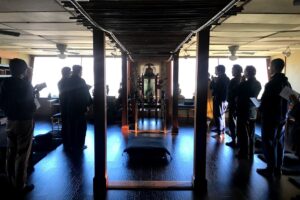Un-political We’re not playing here, messing with Mother Nature ‑ missing our last chance.
In this segment, as promised, we will return to the seemingly zero-sum game being played out in the political arena, under the rubric of “Election Year Zen,” episode #3.
As I pointed out in closing the second segment: This, too – “politics” ‑ is the Dharma. While the course of action that Buddha and the Ancestors of Zen undertook, within the constraints of their cultural context, may not have had obvious political motivations, the very act of establishing and maintaining Zen practice ‑ whether in the form of intentional communities such as a monastery, or less ambitiously, a neighborhood temple or even a hermitage ‑ the effect of doing so upon the local society, and by extension upon the powers-that-be of the era, must have had undeniable political ramifications. Variations on this theme are recorded throughout the history of Zen.
In our life and times, as of the last UnMind posting we had just passed Super Tuesday in this year’s campaign cycle, and now have witnessed the POTUS deliver the annual State of the Union (SOTU) address. Which has, willy-nilly, evolved into a “state-of-the-campaign” address, over the last several 4-year election cycles, as just another blip on the screen of the endless, unremitting campaign, earning its own alphabet-soup acronym ‑ S-O-T-U – abbreviation.
But before we get into the implications for Zen and its relevance to our lives, let me restate a caveat that not only bears repetition, but apparently, and unfortunately, requires it. That is, that Zen, or Buddhism, is not intrinsically political. Or, as is usually stated, it is apolitical. As I characterize it, using my favorite prefix, Zen is un-political. Nonetheless, I am painfully aware that any message about politics, however well-intentioned, is in danger of being interpreted as political, even partisan, in nature. This is a modern catch-22 that has less to do with content than it has to do with context, owing to the highly partisan cultural and ideological divide that has infected the populace with a social and mental virus more virulent than COVID 19. I had forgotten that the virus had made its debut on my birthday, until I came across this reminder in the news feed:

How quickly we forget. I would say “how quickly they forget,” but that would lend to the “us and them” divisiveness plaguing us today. It is just that kneejerk a reaction. I didn’t read the promised “update on where things stand,” but we can assume that it claims some upsides, such as that the virus seems to have been relatively tamed, at long last. But one downside is that the political picture has, if anything, gotten worse.
Both sides of the chasm that is the partisan campaign seem to be bullish on their chances, but could not be more different in their platforms, or lack thereof. Whichever team you are pulling for, you may be reading, or dreading ‑ or reading into ‑ the content of this segment, to conform to your political perspective. I ask you to take a moment to evaluate whether or not that is so. It is a subtle, subliminal, and insidious phenomenon. A curse.
I sometimes wonder if my birth date is also more of a curse than a blessing. The tsunami and meltdown at Fukushima also occurred on March 11, earlier in 2011. If my birth is a kind of curse, it calls into question all of the Panglossian views of this existence as the best of all possible worlds. Maybe this is, in actuality, “Earth 2.” In the penultimate stanza of the Metta Sutta or “Loving Kindness Sutra” it says:
Standing or walking; sitting or lying down; during all one’s waking hourslet one cherish the thought that this way of living is the best in the world
Even this most benign paean to hope: “May all beings be happy”; would most likely be twisted to conform to a one-sided view of reality, if it became just another bumper-sticker in today’s cavalier campaign.
Moving right along: POTUS kicked off the SOTU with a reference to 1941, the year of my birth, citing FDR’s New Deal, which, incidentally, kicked off the alphabet-soup metaphor for the multivarious departments Roosevelt created – the FBI, the CIA, and so on and on and on. He also mentioned Harry Truman, claiming the mantle of both past presidents, while highlighting the current threat to the very institutions of government, and the emphasis on defending democracy, that they and Ronald Reagan, the other party’s past leading man, ostensibly championed.
Which brings us to another point about nonpolitical outcomes of purportedly political decisions: the WWII bombing of Hiroshima and Nagasaki, Japan. Which, for those of us who have inherited the legacy and lineage of Zen from our Japanese predecessors, constitutes a koan of truly agonizing proportions. Just as we cannot condone the “collateral damage” inflicted upon innocent civilians and children in the case of Russia and Israel relentlessly bombing Ukraine and Gaza, respectively; we cannot justify the nuclear hell released upon the citizens of Japan by the self-same POTUS ‑ “Give-‘em-hell-Harry” ‑ that we admire for the accomplishments of his administration. We all share that karma. The atrocity was committed “in our name.” I was about five years old.
Mass bombing of civilians is mass murder. It cannot be rationalized as an act of politics, but represents the collapse, the total bankruptcy, of the international political system. Resorting to brute force in conflicts that our so-called political leaders fail to settle politically means they should be relieved of duty. They are incompetent. This does not ignore the necessity of military defense, in proportional response to military aggression. But it does suggest that the tactics of nonviolent diplomacy need to arise earlier in the process of negotiating conflict, whether on an international, local, or personal scale.
Buddhism’s doctrine of the myth of self seems the place to start, in positing a Buddhist take on these destructive horror shows. And why the impulse to understand the “other,” and arrive at a mutually beneficial solution, does not arise earlier in the process, if ever.
The recent repurposing of the American military forces to deliver much-needed humanitarian aid to Gaza may constitute a silver lining in the otherwise gloomy forecast. Let’s engage in a common design-thinking exercise, the “What if?” scenario. What if the overwhelming power of the military could be used as a non-partisan policing function, forcing a cease-fire before the conflict reaches a set limit of civilian casualties, say 5,000? What if humanitarian aid stood ready-to-go near the hot spots of the world, inserted into the area early on, before the match lit the tinderbox? To those who would argue that the expense would be unbearable, I simply point to the much more massive cost of the bombing itself, not to mention the daunting scale and scope of the cleanup and rebuilding of the aftermath, which, of course, profits certain interest groups immensely. We have a saying in design circles, that there is never enough time and money to do it right the first time, but there is always time and money to do it over. What if we could flip that formula, on a global basis. The alternative seems to be “Earth 2.” Some seem resigned to its ultimate triumph over reason and compassion, called “Armageddon”; others seem fully devoted to making sure that the apocalypse comes to pass, fulfilling their favorite prophecy. Proving them, finally, “right.”
It would be the ultimate irony, would it not, if the end of civilization, and the extinction of the human species, comes about not of necessity ‑ but from a failure of will, fueled by misinformation? That a small percentage of the population with their fingers on the buttons not only do nothing to prevent the final catastrophe, but actually help to bring it about, based on their religious beliefs? Which then turn out to be wrong! No rapture, no kingdom of God on earth ruled by a savior. Just the rubble of what was once a great potentiality, laid waste by ignorance. Not a dystopian future, but no future at all. The greatest category mistake and unintended consequence in history, accidentally bringing human history to an end. What if this planet of ours turns out to be Earth 2, after all?
This is your, and my, karmic koan-du-jour. Answer quickly, or receive thirty blows of my stick!
In the next series of segments, we will return to more prosaic, everyday explorations of Zen and design thinking, while keeping an eye on the ongoing campaign. In May, we will take another look at the developments to date, with a somewhat jaundiced eye to their relationship to the compassionate teachings. Meanwhile, study your ideology thoroughly in practice.








